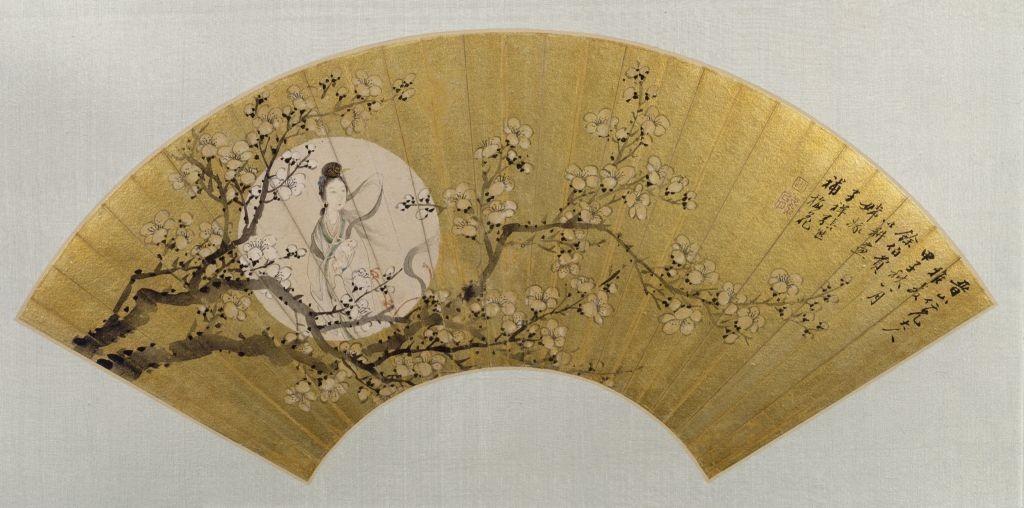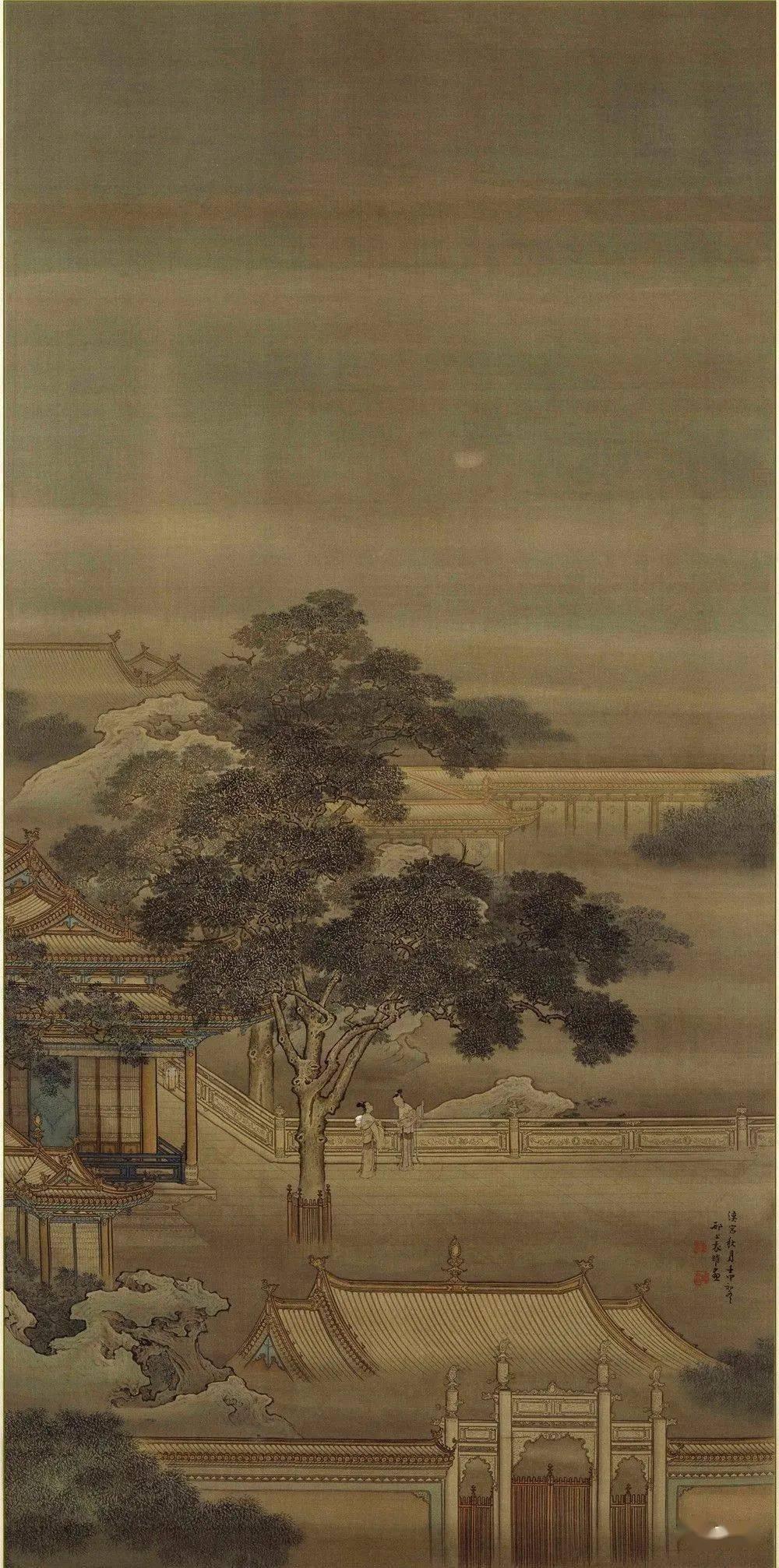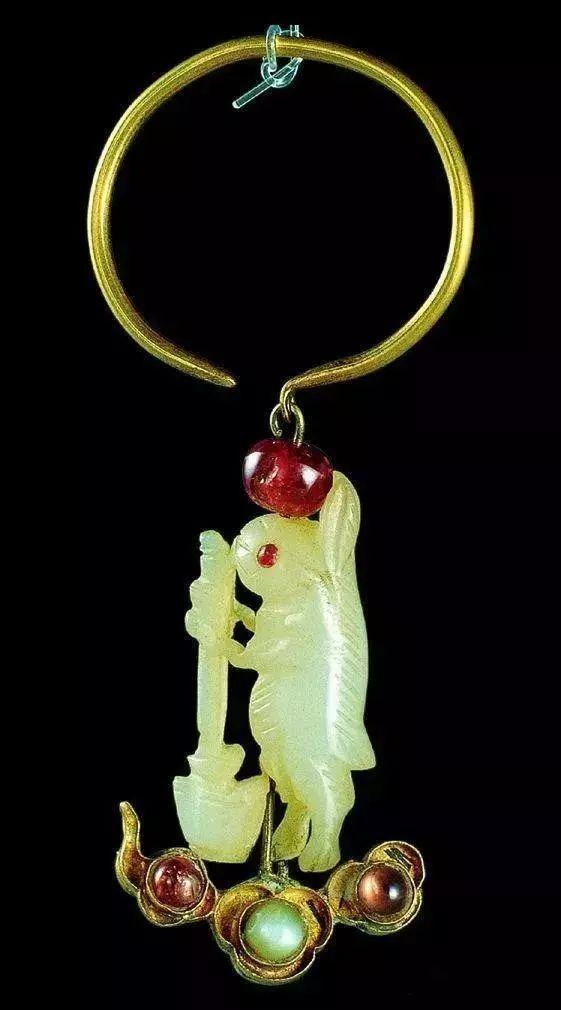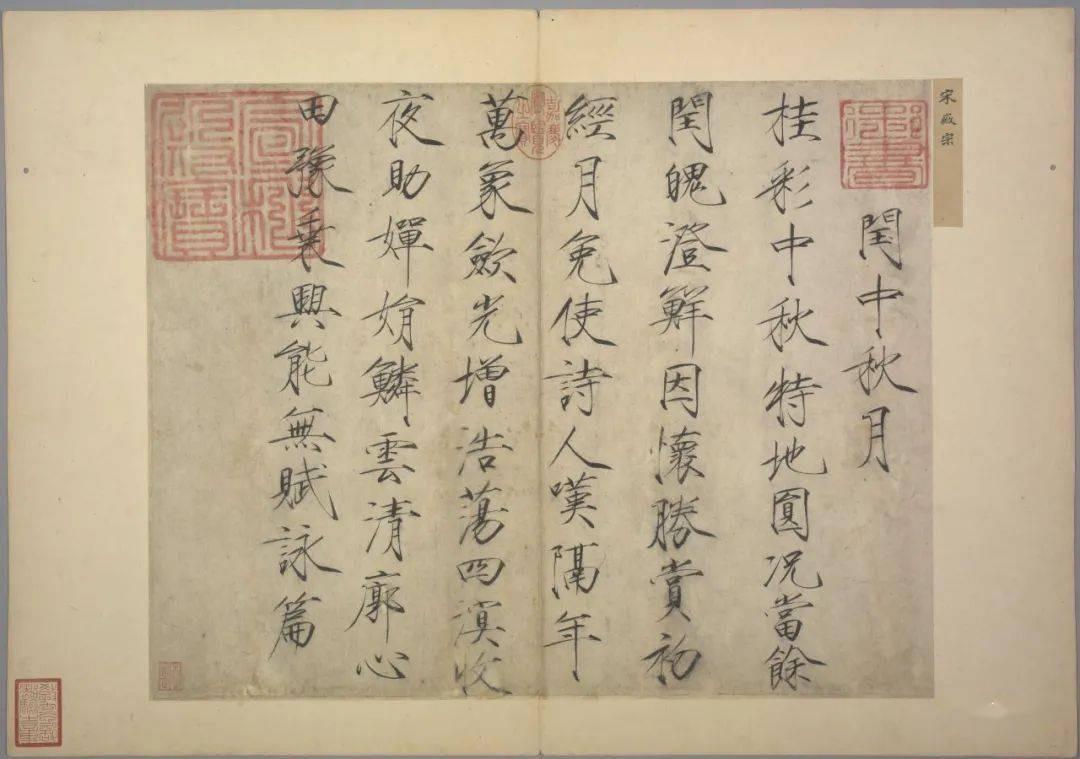The moon shines brightly on ageless classics
 This work by 19th-century painters Fei Yigeng and Zhang Xiong depicts Chang'e cuddling the jade rabbit amid flower-laden plum branches bathed in moonlight. (PHOTO PROVIDED TO CHINA DAILY)
This work by 19th-century painters Fei Yigeng and Zhang Xiong depicts Chang'e cuddling the jade rabbit amid flower-laden plum branches bathed in moonlight. (PHOTO PROVIDED TO CHINA DAILY)
In 1076, Chinese poet and essayist Su Shi found himself in self-imposed exile hundreds of kilometers from the capital of the Northern Song Dynasty (960-1127) after a disagreement with those in power.
Su, who was 39 at the time, wrote the following lines:
Life brings both joy and sorrow, parting and embrace
The moon waxes and wanes in its endless change of phase
Such has been the way since the beginning of the human race
May we live a long life in her grace
To share its luminance despite any distance
His newfound freedom allowed Su (1037-1101) to go hunting — an experience he also captured through words — and to be philosophical on the night of Mid-Autumn Festival, which falls on the 15th day of the eighth month in the Chinese lunar calendar.
Tonight, I know not what night it is Yet I wish to ride the wind to the moon Up there in the crystal palace A single note from my flute will touch many hearts.
A work by Su Shi, a poet during the Northern Song Dynasty (960-1127)
Su did what every Chinese was and is supposed to do on this particular night — gaze at the moon.
Missing his younger brother, he came up with lines that seamlessly fused his imaginings of a journey to the moon:
I wish to ride the wind to the celestial palace
But it is the coldness of the jade halls that I fear
He depicted the ethereal quality of the moonlight as traveling silently "across the vermilion pavilion, through the latticed window, over the face of the sleepless".
Su then started to think deeply about the cyclical nature of all things, which not only dictated the moon's phases, but also made every meeting the beginning of a farewell.
Beautiful and contemplative, Su's writing resonated with Chinese during the next millennium for a particular reason. The moon, considered to be at its roundest and brightest during Mid-Autumn Festival, represents the one thing people have always longed for but have found elusive, if not completely unobtainable: completeness.
 An 18th-century painting by Yuan Yao depicts moon-gazing during a Mid-Autumn night. (PHOTO PROVIDED TO CHINA DAILY)
An 18th-century painting by Yuan Yao depicts moon-gazing during a Mid-Autumn night. (PHOTO PROVIDED TO CHINA DAILY)
One man who embraced that fleeting moment of completeness was the Song Dynasty poet Zhao Dacheng. He wrote these lines as a glowing tribute to the moon:
All bright things drowned out by the moon's luminosity
All dark seas lit up by her radiance
This work would not have become so well known had not Emperor Huizong (1082-1135), the eighth emperor of the Northern Song Dynasty, transcribed it and turned it into a masterpiece of calligraphy in 1110. The work is part of the collection at the Palace Museum in Beijing.
This was not the only time Mid-Autumn Festival was closely associated with a Chinese emperor.
According to legend, those who rose up against the Yuan Dynasty (1271-1368) rulers, led by Zhu Yuanzhang, the would-be founding emperor of the Ming Dynasty (1368-1644), hid the message for a revolt planned for the night of the festival in mooncakes to be distributed among those taking part in the rebellion. The legend, whose authenticity can never be proven, added to the fable surrounding the festival and its best-known food.
At the center of the tale is Chang'e, wife of the legendary archer Hou Yi who shot down nine of the 10 suns that hung in the sky, thus saving the Earth from their scorching heat. Having secretly taken a large dose of an elixir of immortality meant for both herself and her husband, Chang'e floated off into the sky, where she had no choice but to endure self-inflicted solitude.
Tang Dynasty poet Li Shangyin (813-858) wrote these words on the fate of the woman to whom mooncakes are nominally dedicated: "Chang'e must have been remorseful, nursing a broken heart in the immensity of the night sky."
Food historians have argued that the Tang Dynasty (618-907), noted for its openness and frequent exchanges with realms far beyond China, must have made an impact on the nation's culinary traditions. Mooncakes, whose fillings range from lotus seed paste to salted duck egg yolk resembling a full moon, may once have been called hu bing, or cakes from a foreign land (to the empire's west, where the Sogdian merchants traveled the Silk Road).
The authenticity of this remains highly debatable, but one thing is certain — during that time, Mid-Autumn Festival, also known as Moon Festival, became deeply ingrained in popular culture. It was only a matter of time before men of words took note.
 A gold earring features the jade rabbit with its pestle and mortar. The earring belonged to Empress Xiaojing of the Ming Dynasty (1368-1644). (PHOTO PROVIDED TO CHINA DAILY)
A gold earring features the jade rabbit with its pestle and mortar. The earring belonged to Empress Xiaojing of the Ming Dynasty (1368-1644). (PHOTO PROVIDED TO CHINA DAILY)
Sense of nostalgia
Zhang Yinan, researcher of ancient Chinese literature at the National Library of China, said although a large number of Mid-Autumn poems are joyous, those steeped in a sense of nostalgia and loss consistently tug at the heartstrings.
"This is more or less inevitable, thanks to the way in which literature speaks to people. Exploring complex and profound emotions such as love, loss, grief and human suffering allowed people — authors and readers alike — to confront and process their own experiences," Zhang said.
In that respect, the Tang Dynasty offered plenty of opportunities for its poets, among whom Li Bai (701-762) and Du Fu (712-770) were towering figures of their times.
Li Bai wrote the following lines on an autumnal night:
One patch of moonlight envelops the city of Chang'an (the Tang capital)
From ten thousand households comes the monotonous sound of pounding
When will peace be brought to the frontier
So that my beloved will return from his long expedition?
The pounding sound was made by women who, after a long day's work, sat bathed in moonlight beating their freshly woven cloth with wooden clubs to make it softer and ready to be sewn into clothes for the coming winter.
Many born before or after Li Bai linked the moon with warfare and the separations of a woman and her soldier husband — a popular theme thanks to the efforts of Tang Dynasty rulers to defend their extended borders.
Although Li Bai's words could have been composed on any autumnal night, this work has since come to be viewed as an iconic piece for Mid-Autumn Festival, along with many of the poet's other works relating to the moon.
Du, the subject of a 2020 BBC documentary, Du Fu, China's Greatest Poet, grew up during the heydays of the Tang Dynasty in a literary household that nurtured his talent and raised him as a Confucian who valued his family and was eager to serve the court.
 A calligraphic work by Emperor Huizong of the Northern Song Dynasty (960-1127) features a transcribed poem by Zhao Dacheng. (PHOTO PROVIDED TO CHINA DAILY)
A calligraphic work by Emperor Huizong of the Northern Song Dynasty (960-1127) features a transcribed poem by Zhao Dacheng. (PHOTO PROVIDED TO CHINA DAILY)
Zhang said: "None of that experience prepared him for the turmoil and disruption wreaked upon the once-powerful Tang by rebellions led by two of its local warlords, which erupted in 755.
"This was more or less true of Du's generation of poets, who reacted to their pain and pathos with works of emotional rawness and artistic depth. By doing so, they collectively ushered in a golden period of Chinese poetry."
On Mid-Autumn night in 767, four years after the rebellions were put down, Du wrote two poems, one of which includes these lines:
A full moon soars like a bright mirror
My longing for home is strong enough to bend an iron blade
Like floating reeds I have wandered nonstop
The vast distance renders any effort to reach the osmanthus tree (on the moon) futile
It was neither the first nor last time Du wrote about missing his family, including his brothers, wife and children.
Those reading between the lines of this work are acquainted with the legendary figure of Wu Gang, a woodcutter banished to the moon, where he was given the task of using an iron blade to fell an osmanthus tree that kept regenerating.
"Osmanthus", which has the same pronunciation as the Chinese character for "high status", was traditionally viewed as auspicious, especially for young men hoping to attain fame by excelling at imperial examinations.
When he was a young adult, Du wrote that he wanted to "assist my lord until his reputation outshines that of the ancient sage-kings". By the time this work emerged three years before Du died, the poet was tired, disillusioned and even embittered.
In the last sentence of the same poem he wrote:
I gazed at the jade rabbit
Almost able to count its newly grown hairs
The sole company of Chang'e, the jade rabbit always appeared with a pestle and mortar, forever pounding an elixir of immortality, which ironically directly caused the tragedy of the fair lady.
While Wu Gang and the jade rabbit are condemned to hard labor — even though it transformed both to celestial beings — Du spent his life hoping, which had given his works an ageless poignancy.
 Zhang Yinan, researcher of ancient Chinese literature at the National Library of China. (PHOTO PROVIDED TO CHINA DAILY)
Zhang Yinan, researcher of ancient Chinese literature at the National Library of China. (PHOTO PROVIDED TO CHINA DAILY)
Rising star
Su Shi, the poet and essayist, who was also an accomplished calligrapher and public official, got off to a good start in adulthood, before things started to go wrong.
When he was 20, he took the court exam, stunning his examiners with the power of his words. At 24, he was already a rising star who looked to have a shining career ahead of him.
However, things started to head in a different direction in 1071, when the 34-year-old Su openly criticized a prominent minister's reform measures. Su then spent time in self-imposed exile away from the capital, during which he wrote the poem referred to at the start of this article, in which he wondered why the moon was always rounder when he was away from home.
Zhang said: "Su certainly had his complaints, but these are nothing compared with the woeful sense of disenchantment he expressed through another Mid-Autumn poem four years later, in 1080."
The previous year, Su spent 103 days in prison, having been found guilty of producing writing deemed libellous to the court.
"How many times in life have we experienced autumn's chill?" asked the poet, who went on to lament that "too often the moon's glow is obscured by the clouds". There is no mistaking what Su, who "lifts a cup and casts his mournful glance northward (toward the capital)", was alluding to.
During his time in exile in what is now Huanggang city, Hubei province, Su invented a pork dish named after himself, which is still hugely popular.
This free-spirited man never allowed fate to get the better of him. Two years later, on Mid-Autumn Day in 1082, the year Emperor Huizong was born, Su "ascended high and looked afar, gazing into a sky where drifting clouds have left no trace".
That night, he once again "raised my cup", not to bemoan his mistreatment, but to "toast the moon and invite her to dance with me and my shadow".
Su was paying tribute to Li Bai, whose poems on personal sorrows and joys are equally imbued with a sense of sublimity derived from imagination and individualism. Li Bai once wrote about finding company in the moon and his shadow cast by it.
Also in 1082, Su embarked on a nighttime escapade with friends. Climbing to the top of a cliff to release a "primal scream", he later documented the occasion in his literary masterpiece Second Ode on Red Cliff.
Zhang said: "By this time, Su had been through metaphorical revolving doors and ridden the emotional pendulum. But instead of becoming cynical and resentful, he was unflappable. That's why his writing from this point on was often infused with a powerful serenity, which reflected his inner strength and poise."
In the next two decades, Su was called back to the court, only to be assigned various positions in places increasingly farther from home, in the south.
In 1101, 64-year-old Su was called back again, but died during his journey north on July 28 of the Chinese lunar calendar, just two weeks before Mid-Autumn Festival.
In his 1082 poem, Su wrote:
Tonight, I know not what night it is
Yet I wish to ride the wind to the moon
Up there in the crystal palace
A single note from my flute will touch many hearts
The man who once had qualms about his ability to stand the chill of the moon finally made the trip to the palace of Chang'e.


